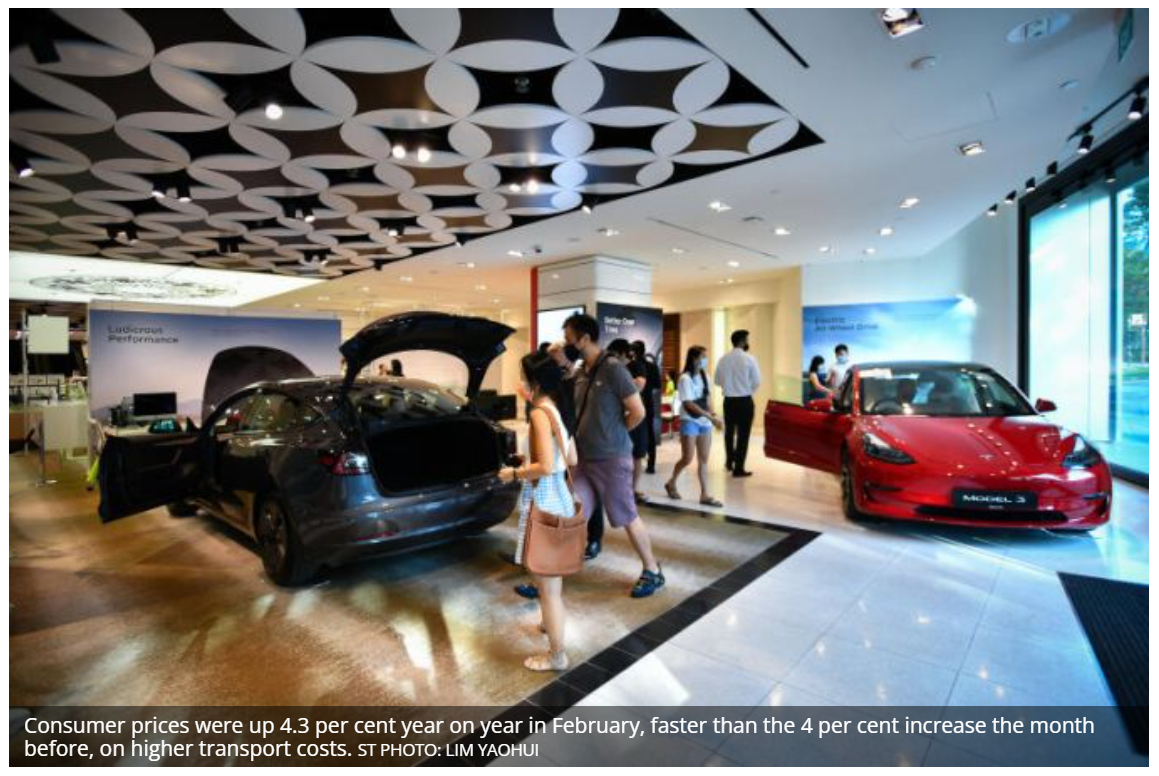Singapore: Core inflation cools to 2.2% in February; price growth mainly driven by cost of cars
CONSUMER prices were up 4.3 per cent year on year in February, faster than the 4 per cent increase the month before, on higher transport costs.
The all-items consumer price index (CPI) reading is at its highest in 9 years, and beat the median forecast of 4.2 per cent in a Bloomberg poll.
But core inflation – a central bank metric that strips out accommodation and private transport costs – cooled to 2.2 per cent, down from 2.4 per cent in January and below analysts’ expectations of a 2.6 per cent print.
Global inflation “is expected to stay high for some time” before easing in the second half of 2022, the Monetary Authority of Singapore (MAS) and Ministry of Trade and Industry (MTI) said in a joint statement on Wednesday (Mar 23) – a more definitive assessment than the outlook released in February.
Besides pressure from elevated crude oil prices, the MAS and MTI also warned of persistent “supply-demand mismatches in commodity markets” and “labour shortages in a number of Singapore’s major trading partners”.
Still, they maintained the forecast for core inflation of 2 per cent to 3 per cent in 2022. The CPI is expected to fall between 2.5 per cent and 3.5 per cent.
Rising inflation concerns earlier fuelled watchers’ belief that the MAS will tighten Singapore monetary policy at its half-yearly review in April.
While the MAS made a pre-emptive off-cycle move in January, “recent stagflationary shocks have likely downshifted policymakers’ projections of the positive output gap” since then, Citi analyst Kit Wei Zheng wrote last week.
Hawkish expectations were ramped up after the Russian invasion of Ukraine on Feb 24. International sanctions on Russia have roiled global energy markets, and food prices will also likely climb.
Private transport costs were up by 17.2 per cent year on year in February, against 14 per cent in January, which the MAS and MTI attributed to how “car prices picked up at a stronger pace”, and accommodation costs rose by 3.3 per cent, from 3.1 per cent before, on a larger increase in residential rents.
But core inflation relaxed on the back of lower inflation for services, food, and electricity and gas, despite an uptick in retail prices.
The increase in electricity and gas prices eased to 16.7 per cent, from 17.2 per cent in January, while services inflation slowed to 2 per cent, from 2.4 per cent in January, on lower telecom fees and no change in holiday expenses.
Food inflation was 2.3 per cent, down from 2.6 per cent before, as “lower inflation for non-cooked food such as fish and seafood, fruits and vegetables more than offset higher inflation for prepared meals”, the report said.
Prices of retail and other goods edged up by 0.2 per cent on the year before, compared with the decline of 0.3 per cent in January, which the MAS and MTI said was due to slower decline in clothes and shoes costs, “as well as a larger price increase for personal effects”.
Selena Ling, OCBC chief economist, told The Business Times in early March that “it appears prudent” to raise inflation forecasts amid war in Ukraine.
The CPI could increase by 4.2 per cent, up from an earlier projection of 3.5 per cent, while core inflation could hit 3.5 per cent, she estimated.
Still, Citi’s Kit noted in his report “monetary policy adjustments may not necessarily be mapped one-to-one” with inflation outlook.
“There could still be some lingering uncertainty about persistence of the current inflation shock beyond the immediate term, which is relevant given the medium-term orientation of policy,” he said.
Source: https://www.businesstimes.com.sg/government-economy/core-inflation-cools-to-22-in-february-price-growth-mainly-driven-by-cost-of-cars


 Thailand
Thailand




